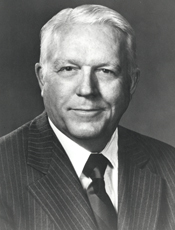John Flynt
This articleneeds additional citations forverification.(March 2013) |
John Flynt | |
|---|---|
 | |
| Member of the U.S. House of Representatives fromGeorgia | |
| In office November 2, 1954 – January 3, 1979 | |
| Preceded by | A. Sidney Camp |
| Succeeded by | Newt Gingrich |
| Constituency | 4th district(1954–1965) 6th district(1965–1979) |
| Member of theGeorgia House of Representatives | |
| In office 1947–1948 | |
| Personal details | |
| Born | John James Flynt Jr. November 8, 1914 Griffin, Georgia,U.S. |
| Died | June 24, 2007(aged 92) Griffin, Georgia, U.S. |
| Political party | Democratic |
John James Flynt Jr.(November 8, 1914 – June 24, 2007) was an AmericanDemocratic Partypolitician who served in theUnited States House of Representativesfor two congressional districts inGeorgiafrom 1954 to 1979. Upon his retirement from the House, he was succeeded by futureHouse SpeakerNewt Gingrich, whom Flynt had narrowly defeated in the two previous elections.
Early life and education
[edit]John James Walker Flynt, Jr. was born on November 8, 1914, inGriffin, Georgia,the only son of John James Flynt and Susan Winn Banks Flynt. He attended Spalding County public schools, before enrolling inGeorgia Military Academy.He then attended theUniversity of GeorgiaatAthenswhere he was a member of thePhi Kappa Literary Society.After graduating with anA.B.degree in 1936. In 1936, he received his commission in theUnited States Army Reserves.Lt. Flynt was assigned to the 6th Horse Cavalry Regiment at Fort Oglethorpe, Georgia. He served from 1936 to 1937. In World War II, Flynt served as Aide-de-Camp for Brigadier GeneralRobert W. Growin the 3rd Armored Division in France and was awarded theBronze StarMedal in 1944. In 1945, Flynt joined the U.S. Army Reserve, where he later retired a Colonel.[1]
Flynt attended law schools at theUniversity of Georgia,Emory University,and received an LLB fromGeorge Washington University Law Schoolin 1940. He was a lawyer in private practice and was assistantUnited States attorneyfor northern district of Georgia from 1939 to 1941 and again in 1945 and 1946.[1]
Early political career
[edit]Flynt was a member of theGeorgia House of Representatives1947–1948, and wassolicitor generalfor Griffin Judicial Circuit from 1949 to 1954. In 1952–1954, he was president of the Georgia Bar Association. Flynt was a delegate to the Georgia State Democratic conventions in 1946, 1950, 1954, 1958, 1962, and 1966, and was a delegate to theDemocratic National Conventionsof 1960 and 1968.
Tenure in Congress
[edit]Flynt was elected as aDemocratto theEighty-third Congressby special election to fill the vacancy caused by the death of RepresentativeA. Sidney Camp,and at the same time was elected to the Eighty-fourth Congress. He was reelected to the eleven succeeding Congresses, serving from November 2, 1954, to January 3, 1979.[2]While in Congress, he was chair of the Committee on Standards of Official Conduct (Ninety-fourthandNinety-fifthCongresses).
Jack Flynt was the focus of two books by the political scientist,Richard Fenno:Home StyleandCongress at the Grassroots.He was one of the most conservative Democrats in the House. Flynt cast votes againstabortion,gun control,theEqual Rights Amendment,Medicare,and public housing. Flynt opposed reciprocal trade agreements fearing that they would hurt the textile industry in his district, and supported price support for agriculture.[3]A staunch segregationist, in 1956, Flynt signed theSouthern Manifesto.[4]Flynt voted against theCivil Rights Acts of 1957,[5]1960,[6]1964,[7]and1968[8]as well as the24th Amendment to the U.S. Constitution[9]and theVoting Rights Act of 1965.[10]
Flynt was reelected nine times without serious difficulty, eight of those times unopposed. He faced aRepublicanonly once during this time, in 1966. The Republican Party was more or less nonexistent in most of Georgia well into the 1970s.
However, in 1974, he was nearly defeated by political newcomerNewt Gingrich,a professor at theUniversity of West Georgia.This came as a considerable surprise, as 1974 was a very bad year for Republicans nationally due to fallout fromWatergate.After an equally close rematch against Gingrich in 1976 (despite formergovernorJimmy Carter's bid for president), Flynt opted not to run for reelection in 1978, when his district was finally won by Gingrich. Gingrich's eventual success was largely due to changing demographics. By the early 1970s, the southern and western suburbs ofAtlantahad begun spilling into the district, and gradually swamped the native-born farming and small-town population in the voting booth.
Later years
[edit]After leaving Congress, Flynt resumed the practice of law and farming operations. He engaged in banking and real estate, and lived inGriffin, Georgia,until his death in 2007.[2]
References
[edit]- ^ab"John J, Flynt, Jr. - Obituary".The Augusta Chronicle.RetrievedMay 14,2018.
- ^ab"John J. Flynt Jr., Georgia Democrat, Is Dead at 92".The New York Times.June 25, 2007.RetrievedMay 14,2018.
- ^Robert Fenno, Congress at the Grassroots, pg. 38
- ^"Southern Manifesto"(PDF).Congressional Record - Senate:4459–4461.
- ^"HR 6127. CIVIL RIGHTS ACT OF 1957. -- House Vote #42 -- Jun 18, 1957".GovTrack.us.Retrieved2024-01-12.
- ^"HR 8601. CIVIL RIGHTS ACT OF 1960. APPROVAL BY THE… -- House Vote #106 -- Apr 21, 1960".GovTrack.us.Retrieved2024-01-12.
- ^"H.R. 7152. CIVIL RIGHTS ACT OF 1964. ADOPTION OF A… -- House Vote #182 -- Jul 2, 1964".GovTrack.us.Retrieved2024-01-12.
- ^"TO PASS H.R. 2516, A BILL TO ESTABLISH PENALTIES FOR… -- House Vote #113 -- Aug 16, 1967".GovTrack.us.Retrieved2024-01-12.
- ^"S.J. RES. 29. CONSTITUTIONAL AMENDMENT TO BAN THE USE OF… -- House Vote #193 -- Aug 27, 1962".GovTrack.us.Retrieved2024-01-12.
- ^"TO AGREE TO CONFERENCE REPORT ON S. 1564, THE VOTING… -- House Vote #107 -- Aug 3, 1965".GovTrack.us.Retrieved2024-01-12.
External links
[edit]- United States Congress."John Flynt (id: F000229)".Biographical Directory of the United States Congress.
- 1914 births
- 2007 deaths
- United States Army colonels
- Democratic Party members of the Georgia House of Representatives
- University of Georgia alumni
- George Washington University Law School alumni
- Democratic Party members of the United States House of Representatives from Georgia (U.S. state)
- Woodward Academy alumni
- United States Army reservists
- United States Army personnel of World War II
- Signatories of the Southern Manifesto
